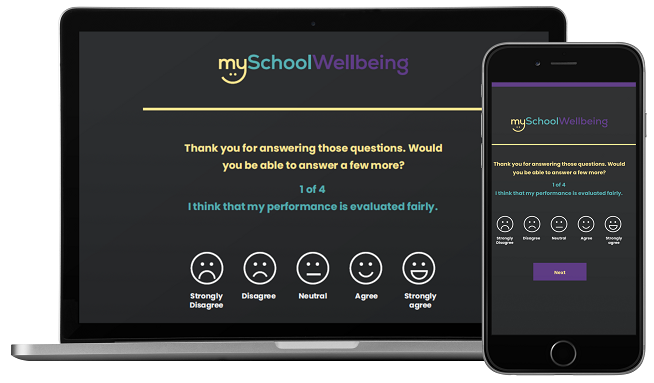Pupils, Parents and school staff can be presented with unique challenges at various stages in their lives. Therefore it is important to recognise how this affects their mental wellbeing and to find ways to provide the appropriate support.
Wellbeing
Every pupil and staff member (regardless of their position) within a school, should feel secure, healthy, productive, active, respected and included.
There are eight helpful factors associated with wellbeing that are designed to encourage, support, and safeguard the health of all of our children and staff within an educational environment. They are:
- Safe
- Healthy
- Achieving
- Nurtured
- Active
- Respected
- Responsible
- Included
This helps everyone including children, parents and others who work with them, such as teachers and health visitors, to have a clear grasp of wellbeing.
Staff Wellbeing & Mental Health
Staff within a school or educational environment play an important role in ensuring the wellbeing of pupils.
In order to do this, they need to feel supported themselves. Some indicators of staff wellbeing are:
- A feeling of being valued by the school
- A good work/life balance
- Low levels of stress
- Feeling like they are part of a team
Pupil Wellbeing
There are many things that can affect the wellbeing of pupils. Some of these are within the control of the school, while others are not.
There are, however, some general indicators that can help show whether pupils are thriving or not.
Positive indicators include:
- Regular attendance at school
- Good levels of achievement
- Feeling happy
- High levels of self esteem
- Positive relationships with peers, family member(s) and adults
- A feeling of belonging to the school community
- Parent/Carer Wellbeing
- Authentic happiness
- Life satisfaction
Negative indicators include:
- Negative emotions
- Ill being
- No interest in learning new skills
- Lacking a sense of purpose in life
- Reduced physical activity
- Being alone
Happy And Unhappy People
The overall well being of parents and carers can have a big impact on the mental health and emotional well being of their children. Some aspects of parent/carer wellbeing are:
- Being involved in their child’s education
- Having a good relationship with the school
- Feeling supported by the school
- Having access to information and advice about parenting
Contributing Factors Of Wellbeing
- Positive emotions & negative emotions
- Physical health & Physical well being
- Natural environment
- Good relationships
- Social support, social well being & emotional support
- Economic well being
- Basic needs in daily life & personal well being
Promote Wellbeing
If you are looking to increase productivity and understand the importance of mental wellbeing, mental health and staff wellbeing within your school, the mySchoolWellbeing platform is where it’s at!
It takes only a few minutes to connect with the mySchoolWellbeing platform, and it immediately aids in the effort to make a difference!
It’s a simple and successful technique for promoting staff health, monitoring progress, and fostering a positive school atmosphere.
The mySchoolWellbeing platform is designed to help schools measure and improve wellbeing.
This is does this by:
- Providing a simple way to collect data on wellbeing
- Helping to identify areas where action is needed
- Offering guidance on what can be done to improve wellbeing
- Supporting the implementation of wellbeing initiatives
- Evaluating the impact of wellbeing initiatives
Don’t take our word for it…..
Read through our client testimonials to see how we’ve assisted other schools, pupils and teachers or better still, download our free sample report to find out exactly how they have been created with Ofsted and governors in mind.
Summary
Staff wellbeing can have both a positive and negative effect on everyday life.
Educate staff and pupils on an individual level to help them understand, take action and improve their wellbeing in the present moment.

Published: 24th June 2022
Back to blog